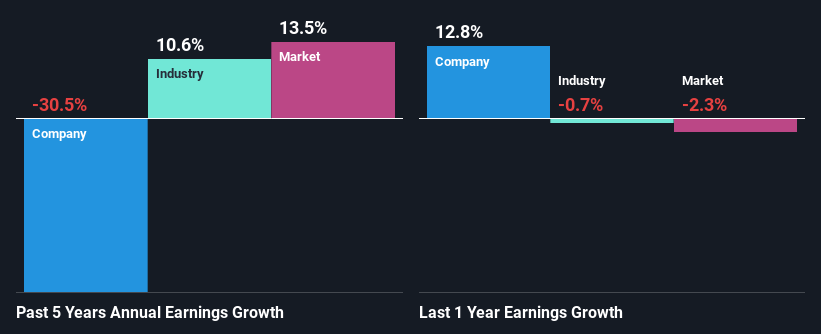MillerKnoll, Inc. (NASDAQ:MLKN) Stock's On A Decline: Are Poor Fundamentals The Cause?
MillerKnoll, Inc. - Common Stock MLKN | 21.47 21.47 | -0.83% 0.00% Pre |
It is hard to get excited after looking at MillerKnoll's (NASDAQ:MLKN) recent performance, when its stock has declined 18% over the past month. We decided to study the company's financials to determine if the downtrend will continue as the long-term performance of a company usually dictates market outcomes. Specifically, we decided to study MillerKnoll's ROE in this article.
Return on equity or ROE is a key measure used to assess how efficiently a company's management is utilizing the company's capital. Put another way, it reveals the company's success at turning shareholder investments into profits.
See our latest analysis for MillerKnoll
How Is ROE Calculated?
Return on equity can be calculated by using the formula:
Return on Equity = Net Profit (from continuing operations) ÷ Shareholders' Equity
So, based on the above formula, the ROE for MillerKnoll is:
4.9% = US$74m ÷ US$1.5b (Based on the trailing twelve months to March 2024).
The 'return' refers to a company's earnings over the last year. Another way to think of that is that for every $1 worth of equity, the company was able to earn $0.05 in profit.
What Is The Relationship Between ROE And Earnings Growth?
So far, we've learned that ROE is a measure of a company's profitability. We now need to evaluate how much profit the company reinvests or "retains" for future growth which then gives us an idea about the growth potential of the company. Assuming all else is equal, companies that have both a higher return on equity and higher profit retention are usually the ones that have a higher growth rate when compared to companies that don't have the same features.
MillerKnoll's Earnings Growth And 4.9% ROE
On the face of it, MillerKnoll's ROE is not much to talk about. A quick further study shows that the company's ROE doesn't compare favorably to the industry average of 9.2% either. For this reason, MillerKnoll's five year net income decline of 30% is not surprising given its lower ROE. We believe that there also might be other aspects that are negatively influencing the company's earnings prospects. For instance, the company has a very high payout ratio, or is faced with competitive pressures.
So, as a next step, we compared MillerKnoll's performance against the industry and were disappointed to discover that while the company has been shrinking its earnings, the industry has been growing its earnings at a rate of 11% over the last few years.

Earnings growth is a huge factor in stock valuation. The investor should try to establish if the expected growth or decline in earnings, whichever the case may be, is priced in. This then helps them determine if the stock is placed for a bright or bleak future. Has the market priced in the future outlook for MLKN? You can find out in our latest intrinsic value infographic research report.
Is MillerKnoll Making Efficient Use Of Its Profits?
MillerKnoll has a high three-year median payout ratio of 83% (that is, it is retaining 17% of its profits). This suggests that the company is paying most of its profits as dividends to its shareholders. This goes some way in explaining why its earnings have been shrinking. With only very little left to reinvest into the business, growth in earnings is far from likely. You can see the 3 risks we have identified for MillerKnoll by visiting our risks dashboard for free on our platform here.
Moreover, MillerKnoll has been paying dividends for at least ten years or more suggesting that management must have perceived that the shareholders prefer dividends over earnings growth. Existing analyst estimates suggest that the company's future payout ratio is expected to drop to 29% over the next three years. As a result, the expected drop in MillerKnoll's payout ratio explains the anticipated rise in the company's future ROE to 12%, over the same period.
Conclusion
On the whole, MillerKnoll's performance is quite a big let-down. Because the company is not reinvesting much into the business, and given the low ROE, it's not surprising to see the lack or absence of growth in its earnings. That being so, the latest industry analyst forecasts show that the analysts are expecting to see a huge improvement in the company's earnings growth rate. Are these analysts expectations based on the broad expectations for the industry, or on the company's fundamentals? Click here to be taken to our analyst's forecasts page for the company.
This article by Simply Wall St is general in nature. We provide commentary based on historical data and analyst forecasts only using an unbiased methodology and our articles are not intended to be financial advice. It does not constitute a recommendation to buy or sell any stock, and does not take account of your objectives, or your financial situation. We aim to bring you long-term focused analysis driven by fundamental data. Note that our analysis may not factor in the latest price-sensitive company announcements or qualitative material. Simply Wall St has no position in any stocks mentioned.




